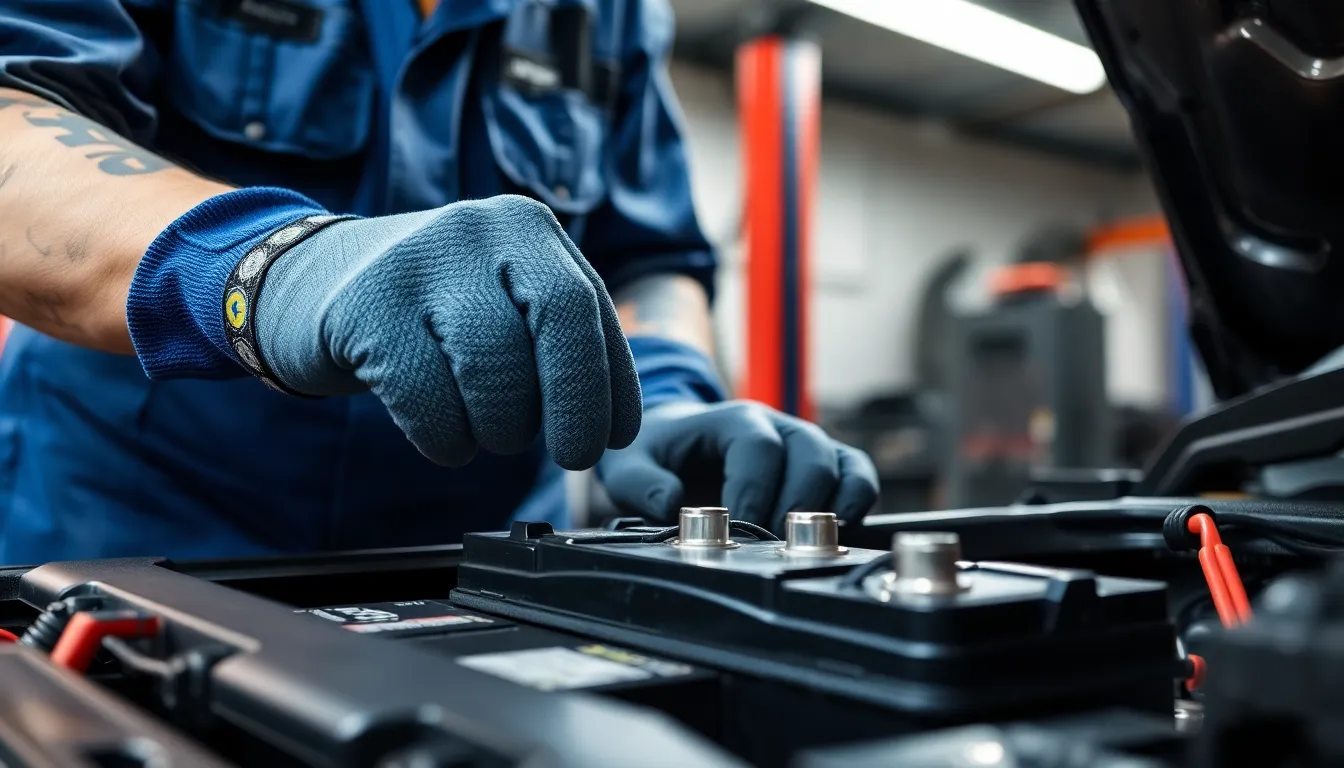Choosing the right battery for a car can feel like solving a puzzle with no picture on the box. With so many options out there, it’s easy to get lost in the sea of numbers and letters. But fear not! Finding the perfect battery doesn’t have to be a daunting task; it can be as simple as picking the right snacks for a road trip.
Imagine cruising down the highway without a care in the world, powered by a battery that’s just as reliable as your favorite coffee shop. Whether it’s a compact sedan or a rugged SUV, the right battery can keep your engine humming and your adventures rolling. Let’s dive into the world of car batteries and uncover what fits best for that trusty steed parked in your driveway.
Table of Contents
ToggleUnderstanding Car Batteries
Choosing the right car battery can seem daunting. Key factors, like battery types and specifications, play a significant role in selecting the best option.
Types of Car Batteries
Lead-acid batteries, the most common type, come in two varieties: conventional and maintenance-free. Conventional batteries require regular checks, while maintenance-free ones, as the name suggests, don’t require upkeep. AGM (Absorbent Glass Mat) batteries offer enhanced performance and longer life, ideal for high-demand vehicles. Lithium-ion batteries, gaining popularity, provide lightweight options with a longer lifespan, suitable for electric and hybrid vehicles. Each battery type caters to specific vehicle needs, ensuring optimal performance and reliability.
Battery Specifications
Important specifications include battery group size, cold cranking amps (CCA), and reserve capacity (RC). Battery group size determines compatibility with the vehicle, aligning with dimensions and terminal placement. CCA measures a battery’s ability to start a car in cold temperatures, indicating how effectively it provides power. Reserve capacity indicates how long the battery can run essential electronics when the engine isn’t running. Prioritizing these specifications leads to a better battery selection that enhances vehicle performance and lifespan.
Factors to Consider When Choosing a Battery

Choosing the right battery involves several important factors that ensure compatibility and performance. Understanding these elements helps enhance vehicle reliability.
Vehicle Compatibility
Compatibility with the vehicle’s specifications tops the list. The battery group size dictates fitment in the vehicle’s battery tray. Each vehicle model requires a specific size for optimal performance. Cold cranking amps (CCA) play a critical role for reliable starts, especially in cold weather. A CCA rating between 400 and 800 serves most standard vehicles. Considering reserve capacity is also essential, as it allows electronics to function during engine-off scenarios. Researching the owner’s manual or checking with the manufacturer guarantees an informed choice.
Driving Habits
Driving habits significantly influence battery choice. Frequent short trips may cause a battery to underperform, leading to premature failure. Those using their vehicle daily often benefit from higher CCA ratings to accommodate extra demands. On the other hand, long-distance drivers can opt for batteries with more reserve capacity, ensuring adequate power for accessories. Those who leave their vehicles parked for extended periods should consider maintenance-free options, which minimize maintenance needs. Understanding specific driving patterns aids in selecting a battery that aligns with individual needs.
Battery Brands and Recommendations
Finding the right battery brand enhances reliability and performance. Several reputable brands offer quality options for various vehicles.
Top Battery Brands
- Optima: Known for high-performance AGM batteries, Optima provides superior starting power and durability, making them popular among enthusiasts.
- Interstate: Trusted for its extensive network and reliable service, Interstate batteries are robust and widely available, delivering excellent value for standard vehicles.
- DieHard: Recognized for its longevity, DieHard batteries offer strong performance across different weather conditions, catering to diverse driving needs.
- ACDelco: This brand is synonymous with reliability and often supplies original equipment to many automakers, ensuring compatibility and consistency.
Budget-Friendly Options
- EverStart: Sold at Walmart, EverStart presents affordable alternatives without sacrificing quality, catering to various vehicle types.
- NAPA: Known for competitive pricing, NAPA batteries provide reliable performance backed by a strong warranty, making them attractive for budget-conscious consumers.
- Duracell: This brand offers dependable batteries at reasonable prices, ensuring customers find solid options without overspending.
- Super Start: Available at O’Reilly Auto Parts, Super Start delivers good value with a variety of batteries suitable for budget-friendly choices.
Battery Maintenance Tips
Maintaining a car battery ensures performance and longevity. Regular attention to several key areas helps avoid unexpected breakdowns.
Regular Checks
Conducting regular checks on a car battery helps identify potential issues early. Inspect terminals for corrosion, as buildup can interfere with connectivity. Ensure connections are tight; loose clamps can cause power loss. A routine voltage test reveals battery health and charge level, typically aiming for 12.6 volts or higher when the engine is off. Checking the fluid level in non-maintenance free batteries is vital, as low levels can lead to damage. Scheduling these checks every few months promotes reliability, especially before extreme weather conditions.
Proper Charging Techniques
Using proper charging techniques significantly extends a battery’s lifespan. Always charge a battery with a charger specifically designed for automotive batteries; avoid using regular chargers. Overcharging can damage the battery, so following the manufacturer’s recommendations for charge time is crucial. Employing a trickle charger while the vehicle sits for long periods helps maintain charge without overloading. Clean connections and cables ensure efficient power transfer during charging. This diligence in care maintains battery performance, ensuring a reliable start every time.
Choosing the right battery for a vehicle doesn’t have to be a daunting task. By understanding key specifications and considering individual driving habits, drivers can make informed decisions that enhance their vehicle’s performance. With a variety of reliable brands available, it’s possible to find a battery that fits both needs and budget.
Regular maintenance also plays a crucial role in ensuring battery longevity and reliability. By following best practices for care and upkeep, drivers can avoid unexpected issues and enjoy a dependable start every time. Armed with knowledge and the right tools, selecting the ideal car battery becomes a straightforward process.



